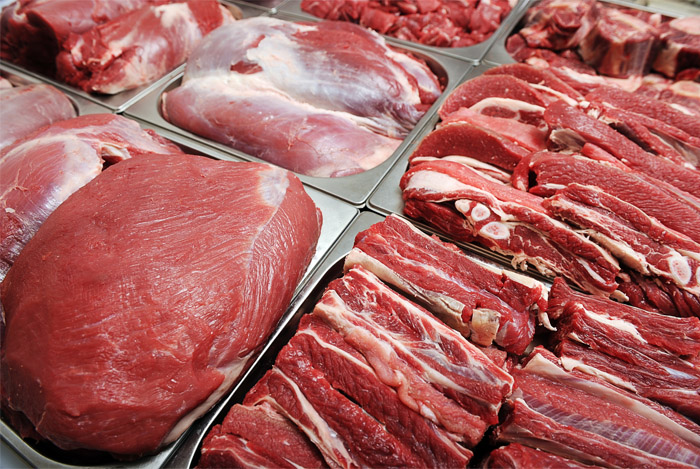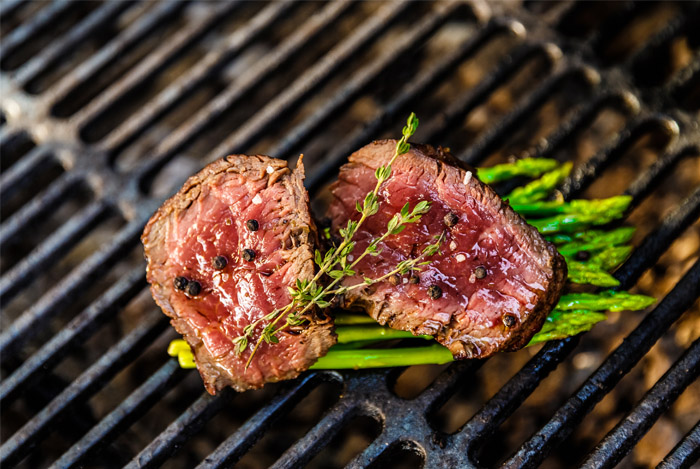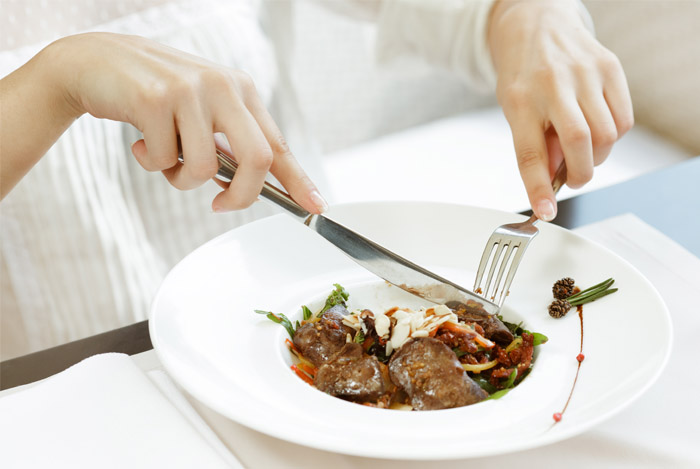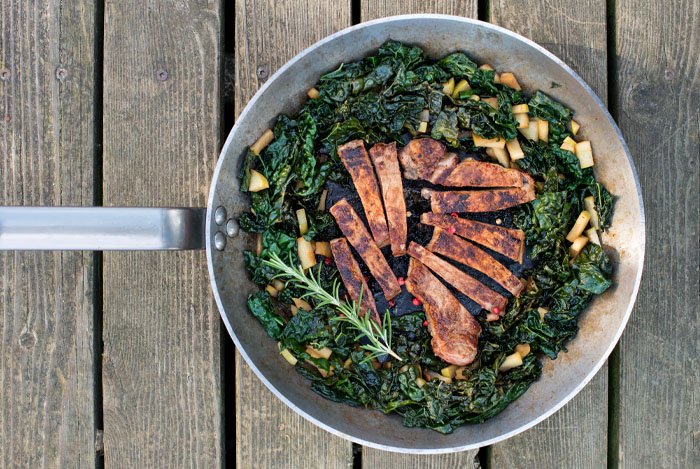A recent report from the International Agency for Research on Cancer (IARC), a branch of the World Health Organization (WHO), determined that red meat and processed meat consumption correlated with increased risks of cancer.
Now, we as human beings have been hunting and eating meat since our early evolution – using fire to cook meat may have been the reason primitive cavemen became intelligent human beings afterall.
Vegans and vegetarians may have their own reasons for avoiding meat, but it’s an enjoyable staple for many of us – in moderation. An excess of red meat isn’t healthy; it’s been linked to increased risk of heart disease and type 2 diabetes.
But who doesn’t love a juicy burger or a perfectly cooked steak every once in awhile?
After today, every-once-in-a-while may be close to every never. Cancer is a game changer, right?
Before we get into the review that may send us running for the vegetarian hills, let’s get some basics out of the way.
The report we’ll be talking about today makes a distinction between processed and unprocessed meat, and one of them is much worse for your health.
Processed Vs. Unprocessed Meat
There’s a big difference between unprocessed meat and processed meat, and they carry equally different health risks.
Processed Meat
 We talked about how you should avoid processed meat like the plague in a previous post, so I won’t rehash that again.
We talked about how you should avoid processed meat like the plague in a previous post, so I won’t rehash that again.
To recap: when you think about processed meats, think about meat products that have relatively long shelf-lives.
Processed meats include products such as:
- Deli meats
- Hot dogs
- Bacon
- Sausage
- Pepperoni
- Corned beef
- Canned meat
- Jerky
By definition, chicken and turkey products – such as chicken sausages and turkey bacon – also fall into this category, even though they’re technically white meat and not red.
All of these meat products are considered “convenience meats” because it’s pretty much OK for consumers to enjoy these foods right out of the package with minimal cooking required.
Preserving these meats so they’re shelf-stable and consumer-ready used to mean long processes of smoking and salting. However, now they’re altered with added chemicals, flavorings, and preservatives to keep them fresher longer.
It’s these curing processes that may be carcinogenic in and of themselves.
Unprocessed Red Meat
 When we talk about unprocessed red meat, we’re referring to meat that’s red when raw, such as:
When we talk about unprocessed red meat, we’re referring to meat that’s red when raw, such as:
- Beef
- Pork
- Veal
- Lamb
- Mutton
- Goat
- Horse (if that floats your boat)
While unprocessed meat doesn’t have all the same additives as processed meat, we still need to be careful.
Try to choose organic, grass-fed meat whenever possible; it won’t be full of hormones, artificial chemicals, or drugs and antibiotics, which some unprocessed grain-fed meats will have.
Antibiotics and added hormones have been suspected to play a part in the creation of endocrine problems, including cancer.
So now that we know what we’re dealing with, what does the science say?
A Controversial Study Reveals Confusing Results
 The IARC gathered 22 scientists from ten countries to pore over data from more than 800 studies on over 12 types of cancer.
The IARC gathered 22 scientists from ten countries to pore over data from more than 800 studies on over 12 types of cancer.
They evaluated 984 possibly carcinogenic agents — from chemicals to careers — and pooled this evidence together in a mega review.
After analysis of the data, the researchers estimated that every 50 g, or roughly 2 ounce, portion of processed meat eaten daily increases the risk of colorectal cancer by about 18%.
That serving size is basically the equivalent of one small hot dog or about two slices of salami or deli ham.
There were positive links between red meat and pancreas, stomach, and prostate cancer as well, but they were not as strong as those found associated with processed meat.
Scientists now classify processed meat as a known carcinogen, which means it’s a cancer-causing agent. This puts it in the same category as tobacco and asbestos – surprised?
Processed Meat is Not Safe
 The American Institute for Cancer Research (AICR) found convincing evidence that consuming cured and processed meats leads to colorectal cancer.
The American Institute for Cancer Research (AICR) found convincing evidence that consuming cured and processed meats leads to colorectal cancer.
According to one study of participants from ten European countries, the heaviest consumers of processed meat were 44% more likely to suffer from premature death than those who ate very little processed meat.
Those participants consuming processed meat in high levels increased their heart disease death risk by 72%, and cancer by at least 11%.
The most recent estimates of the Global Burden of Disease Project, an independent academic research organization, attribute about 34,000 cancer deaths per year worldwide to diets high in processed meat.
And a review of more than 7,000 clinical studies investigating the relationship between cancer rates and diet choices all point to the same conclusion: processed meats should be off-limits.
These studies and more are why processed meat has been classified as a Group 1 carcinogen, which means it’s in the same company as tobacco and ionizing radiation.
“But this does NOT mean that they are all equally dangerous.”
Ian Johnson, emeritus fellow at the Institute of Food Research, said:
“It is certainly very inappropriate to suggest that any adverse effect of bacon and sausages on the risk of bowel cancer is comparable to the dangers of tobacco smoke, which is loaded with known chemical carcinogens and increases the risk of lung cancer in cigarette smokers by around twentyfold.”
Ok, so processed meat is bad, but if I’m deciding on a slice of bacon or a cigarette, the bacon is healthier. It’s all about perspective. Then again, two wrongs don’t make a right, as my mother would say.
So what about unprocessed red meat? Is that any better?
Unprocessed Red Meat
 Unprocessed red meat has been classified as a Group 2A carcinogen. This means it’s probably carcinogenic, but there’s no definite evidence to prove so.
Unprocessed red meat has been classified as a Group 2A carcinogen. This means it’s probably carcinogenic, but there’s no definite evidence to prove so.
Researchers from one review that examined 35 studies, and another that reviewed 25 studies, discovered that unprocessed red meat had very weak cancer risks for men and almost negligible risks for women.
However, there are known carcinogens in unprocessed red meat.
All red meat is a source of heme iron, which triggers the production of N-nitroso compounds during digestion. These compounds have been known to cause cancer in several human studies, as well as animal ones.
The two other cancer-causing compounds formed in meat during cooking are:
- Heterocyclic amines (HCAs), which are formed when meat sears at high temperatures.
- Polycyclic aromatic hydrocarbons (PAHs), which get into your meat when it’s charbroiled.
Since raw food doesn’t contain any HCAs or PAHs, most of our exposure comes from cooked meats, including fish.
Temperature is the single most important factor of releasing these carcinogens; you’ll be exposed to a bit of them at temperatures in the low 200s, and will get a nasty dose when you heat your food above 500 degrees.
Eating meat cooked at very high temperatures has been linked to:
“HCAs and PAHs have been found to be mutagenic – that is, they cause changes in DNA that may increase the risk of cancer.”
While studies haven’t directly linked these carcinogens to cancer deaths, they’re definitely not something to mess around with.
How You Cook Your Meat Matters
 If you’re a fan of charred or well-done grilled meats, don’t swear them off forever; there is a bright side.
If you’re a fan of charred or well-done grilled meats, don’t swear them off forever; there is a bright side.
Marinating your meat in antioxidant-rich spices, such as rosemary, thyme, ginger, oregano, turmeric, curry, spicy chili, and paprika, for at least one hour before cooking can cut HCAs by as much as 87%, according to a study completed at Kansas State University.
“The lower-risk methods are baking and broiling,” says Stephanie Melkonian, a post-doctoral fellow at the MD Anderson Cancer Center.
You could also try finding healthy recipes for that slow cooker you have buried in a cabinet somewhere. These time-savers don’t cook hotter than 300 degrees.
Remember: the lower the temperature for cooking your meat, the fewer HCAs and PAHs you’ll be exposed to.
Take this Report with a Grain of Salt
 First off, this review isn’t groundbreaking news in the nutrition world.
First off, this review isn’t groundbreaking news in the nutrition world.
Here’s a study from 1975 that says: “Dietary variables were strongly correlated with several types of cancer, particularly meat consumption with cancer of the colon.”
We keep studying this topic nearly 40 years later because it’s so hard to get solid scientific evidence.
The IARC says it used studies spanning 20 years in participants from around the world. But red meat isn’t something that everyone in the world has equal access to.
High intakes tend to correlate with developed countries, while poorer countries see very minimal meat consumption.
Developed countries usually follow typical “Westernized” lifestyles, i.e. the citizens also:
- Drink alcohol and smoke cigarettes
- Eat highly processed foods with simple carbs and high sugar content
- Skimp on fruits and veggies
- Pay zero attention to fiber
- Have sedentary activity levels
- Tend to have high BMIs
How can we analytically separate red meat consumption from all these other factors that might also increase the risks of developing cancer?
Simple answer: we can’t.
Controlled clinical trials would have to find participants who had relatively similar ages, lifestyles, and family medical history.
Then they would need to isolate these participants in their own world where their food, exercise, and lifestyles were controlled to eliminate other variables from interfering with the meat consumption results.
Because cancer can take years — sometimes decades — to develop, finding volunteers to literally donate their lives to research probably won’t ever happen.
So instead, researchers used studies of participants who already have cancer to see if they could find correlations between their diagnoses and their eating habits.
Notice that word correlation.
Correlation does not mean causation.
For example, the number of Nobel Laureates won by a country correlates surprisingly well with per capita chocolate consumption.
Does that mean chocolate makes you smarter?
I know dark chocolate has amazing health benefits, but I don’t know about that one!
Here’s my biggest problem with this review: most of the studies used were based on self-reported participant data.
Meaning, the participants had to record their food intake for days, weeks, and probably years.
Food recording is one of the reasons I don’t believe in calorie calculators; it’s so hard to remember what you ate, when you ate it, every single day.
On top of the fact that most people underestimate what they’re eating. Participants with cancer diagnoses could have said they only ate five slices of bacon and one hamburger during the week, when it was really eight slices of bacon, two hamburgers, and a couple of meatballs.
This is what we’re basing our evidence on?
So Should You Stop Eating Meat?
 On average Americans eat about a quarter pound of red meat per day.
On average Americans eat about a quarter pound of red meat per day.
While we know that processed meats have the strongest associations with cancer, the links between unprocessed red meat are much weaker and much less consistent.
Some information we do know is that food habits associated with cancer include eating:
- Processed meats
- Red meat more than once a week
- Grilled meat more than twice a week
I find it interesting that the researchers from this mega review never recommended a “safe” amount of meat to eat.
Maybe because there’s not enough empirical evidence to give them this information.
If you don’t want to become a vegetarian, but you still want to be healthy, limiting your processed meat consumption to no more than two servings a month sounds reasonable to me.
And I wouldn’t eat any more than two servings per week of unprocessed meat.
Meat is a healthy addition to your diet when eaten this infrequently.
Grass-fed meat can be a tasty source of protein, iron, and healthy omega-3s. It’s even leaner than grain-fed meat, which makes it lower in total fat and saturated fat.
Is it a healthier option than a protein-rich and omega-packed filet of salmon? Well, no.
But “red meat also supplies vitamin B12, which helps make DNA and keeps nerve and red blood cells healthy, and zinc, which keeps the immune system working properly.”
To counteract the bad effects of eating meat — while still enjoying the positive ones — add more whole fruits and vegetables to your diet and exercise more frequently.
Get excited for Meatless Mondays and try out a few awesome vegetarian recipes that’ll make you forget all about meat.
Final Notes
 Remember, there are lots of carcinogens in this world — from breathing to working late night shifts — so you really have to feed your body right the majority of the time.
Remember, there are lots of carcinogens in this world — from breathing to working late night shifts — so you really have to feed your body right the majority of the time.
This means eating a diet rich in free-radical fighting fruits, vegetables, and antioxidants that will protect you while also scavenging for carcinogens and destroying them.
Update your diet to include more delicious high-fiber foods to help your liver detoxify all those HCAs and PAHs and remove them from your body.
If you’re at risk for certain cancers, get screened regularly and increase your chances of detecting abnormalities early on, when they’re most successfully treated.
How much meat do you typically eat? Are you going to change your eating habits based on these findings? Share your thoughts with me in the comments— I’d love to hear what you think!
The post Does Eating Red Meat Really Cause Cancer? appeared first on Nutrition Secrets.
http://www.nutritionsecrets.com/does-eating-red-meat-really-cause-cancer/
No comments:
Post a Comment